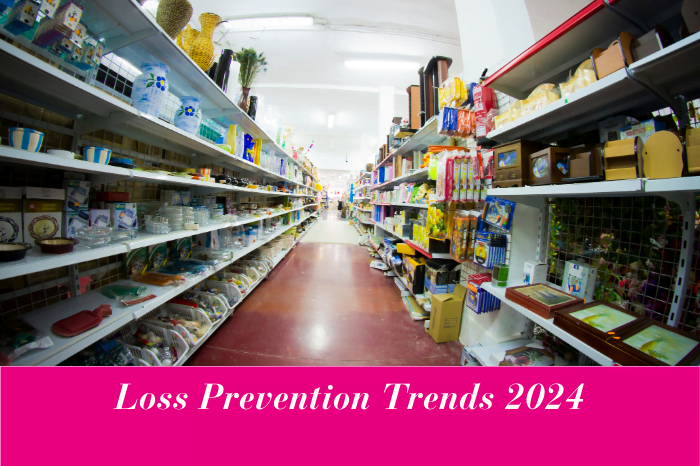Loss Prevention Trends shaping retail in 2024
Loss prevention in the retail sector is undergoing a transformative phase in 2024, necessitated by the imperative to protect profits amid a multitude of challenges.
From the surge in shoplifting to broader concerns like shrinkage, retailers are confronted with multifaceted issues demanding innovative solutions. This report delves into key trends in loss prevention, shedding light on strategies that encompass technology, safety and collaboration while underscoring the pivotal role of the people involved.
Trend 1: Tackling Crime – The Rising Threat of Shoplifting
Shoplifting has reached epidemic levels, with alarming statistics impacting retailers on a global scale. The British Retail Consortium (BRC) reports a staggering 68% increase in retail thefts across major UK cities, costing retailers £1 billion in the span of a year.
Co-op, a prominent UK retailer, disclosed a £33 million loss in six months due to shoplifting. This trend emphasises the urgent need for collaborative efforts between businesses, law enforcement, and Business Improvement Districts (BIDs) to combat evolving criminal activities.
Project Pegasus: In response to the rise in habitual thieves and organised retail crime, major UK retailers, including Tesco, M&S, and Sainsbury’s, have collectively funded Project Pegasus. This collaborative initiative involves running CCTV footage through police computers to identify prolific offenders. Private security entities like Mitie and the National Business Crime Solution (NBCS) are also part of this effort, aiming to enhance safety through intelligence gathering.
For many years, Heart of London Business Alliance (HOLBA) has been the catalyst for positive change in London’s West End. As a not-for-profit, HOLBA focus on securing the long-term commercial and cultural well-being of the area.
Robin Hibbert, Director of Company Operations at Heart of London Business Alliance commented: “Retail crime in the West End is not just a threat to businesses but to the entire community. We have long called for a greater police presence in the West End to deter criminal activities and instil a sense of security. We also need effective collaboration between businesses, law enforcement and BIDs to combat evolving criminal trends effectively and ensure a safer area for all.”
In the relentless pursuit of crime prevention, we can’t forget the dedicated teams working behind the scenes, facing the pressures of shoplifting epidemics. The individuals behind loss prevention are unsung heroes, committed to safeguarding both businesses and communities.
Trend 2: Prioritising Safety and Wellbeing
In 2023, safeguarding staff becomes a critical trend as the sector grapples with an ‘intolerance epidemic.’ Retail workers are increasingly subjected to verbal and physical abuse, impacting both acquisition and retention.
These challenges resulted in a campaign where the Retail Trust joined forces with the British Retail Consortium (BRC), Foot Anstey, Peoplesafe, Usdaw and leading retailers, including Ann Summers, B&Q, Primark and WHSmith to call for urgent, meaningful change that protects and supports the wellbeing of our colleagues. You can read more about Respect Retail here.
Peoplesafe CEO, Naz Dossa, emphasises the need for a people-centric approach to security and loss prevention.
“In 2024, we believe that the trend around protecting staff and re-energising the perception of safety and wellbeing in the sector will be crucial. Our partners, the Retail Trust, have recently shown the extent of the ‘intolerance epidemic’ and how it is impacting the sector. They recently revealed that as many as two in five (41%) retail workers are now shouted at, spat on, threatened, or hit every week – just for doing their job*. Understandably, this is heavily impacting staff acquisition and retention, with 42% considering quitting their jobs or leaving retail completely.
“As a provider of people protection technology, we’ve seen an alarming 34% rise in the number of retail-related incidents coming into our ARC (Alarm Receiving Centre) compared to last year and there is no doubt that this rise in public aggression is contributing to increasing concerns surrounding employee safety.
“This trend is unfortunately not going to go away overnight, which makes a focus on security and loss prevention fundamental to ensuring a sustainable retail future, with Security, Health & Safety and HR professionals critical in working together to build the right safety and wellbeing culture to attract and retain employees.
“Transformative change will be driven by developing a people-centric approach, putting employee safety and wellbeing at the very top of the agenda. Now, more than ever, employers must prioritise their people and put the necessary measures in place to ensure that they feel both protected and supported.”
Example: The Works
The Works, a people-focused retailer, has recorded success in improving feelings of safety and evidence capture by providing personal safety alarms to staff. Recognising the impact of crime risk on employee retention, The Works allocates personal safety devices where needed, ensuring 24/7 protection both inside and outside of official working hours.
Trend 3: Holistic Approach with Technology and AI
As new safety and security challenges emerge, retailers are adopting innovative technologies and advanced solutions to address loss prevention. Artificial Intelligence (AI) stands out as a game-changer, with applications ranging from video analytics systems powered by AI and machine learning to smart shelves, RFID tags, and automated Point of Sale systems. This field of development is only in its infancy.
Store Layout and Design: AI algorithms can analyse foot traffic patterns, identifying high-risk areas that require special attention. Retailers use this information to optimise store layout and design, minimising physical loss by reducing congestion and improving visibility in high-traffic areas.
Employee Training: AI assists in understanding employee behaviour and identifying training needs. By tracking behaviours such as attendance and punctuality, the system can suggest training programs to minimise losses.
Spoilage: Retailers are increasingly turning to frictionless technology, not only as a theft deterrent but also to reduce spoilage through real-time in-store data.
Examples of retailers leveraging AI for loss prevention:
- Walmart: Investing heavily in AI-powered surveillance systems, Walmart uses computer vision technology to monitor in-store activities and identify suspicious behaviour, such as items being placed in bags without scanning at checkout.
- Amazon Go Stores: These stores exemplify how AI enables frictionless shopping while preventing theft. Through a combination of computer vision, sensor fusion, and deep learning, the system detects when customers take items from shelves, ensuring accurate tracking without traditional checkout.
- Zippin: A technology company offering cashierless checkout solutions, Zippin employs AI, cameras, sensors, and machine learning to track customer movements and item selections in real-time, streamlining the shopping experience and preventing theft.
- Trigo Vision: Specialising in cashierless technology, Trigo Vision uses AI and computer vision to track customer movements within the store. The technology detects anomalies, such as items put into bags without scanning, alerting staff to potential theft or errors.
- Cisco Meraki: Providing smart surveillance solutions, Cisco Meraki’s AI-powered cameras analyse customer behaviour, identifying unusual patterns that may indicate theft or security issues. The system can send real-time alerts to store security personnel.
Shrinkage beyond Shoplifting and Crime
While shoplifting remains a significant concern, shrinkage extends beyond theft to include vendor fraud, accidental theft, and human error. The impact is substantial, with some retailers experiencing over 50% unknown shrinkage. Broad issues such as food waste add further challenges globally.
Smart technologies offer potential solutions by reducing both theft and spoilage. Guy Yair, Chief Revenue Officer at Trigo, emphasises that traditional measures are no longer sufficient, and frictionless technology can deliver tools to deter theft, reduce spoilage, improve stock visibility, and enable predictive stock management.
In 2024, retailers are adopting an integrated approach to loss prevention, recognising that it goes beyond implementing advanced technologies and involves a smarter use of technology, budgets, and human resources.
Trend 4: A Collective Approach
In today’s retail landscape, loss prevention has become a significant challenge for businesses to address due to increasing instances of theft, fraud, and pilferage. Tackling this issue requires a collective approach of agencies, people, and technology.
- Agencies: Retail organisations should collaborate with various agencies, including law enforcement and industry associations, to share intelligence, resources, and best practices on loss prevention. This partnership can provide valuable insights and help deter criminal activities.
- People: Human resources play a critical role in loss prevention. Retailers should train store associates in conflict resolution, customer service, and suspicious activity reporting. Staff should be empowered to make split-second decisions to prevent theft or apprehend potential suspect.
As already mentioned, major retailers, are collectively funding Project Pegasus, a collaborative Police-Retailer partnership to address habitual thieves and organised retail crime. This initiative aims to enhance safety through intelligence gathering, but its efficacy may face challenges due to delays in the court system.
The collaboration of retail, law enforcement, and security entities in initiatives like Project Pegasus exemplifies the collective dedication to creating a safer retail landscape. Recognising and celebrating these collaborative efforts is essential.
Have you got an amazing Loss Prevention Team?
In the relentless pursuit of loss prevention, it’s crucial to celebrate the unsung heroes—the dedicated individuals and teams working tirelessly to safeguard businesses and communities.
We invite retailers to nominate their team heroes who are making a significant difference in the category of Loss Prevention for the People in Retail Awards 2024? Give credit where it’s due and shine a spotlight on the incredible contributions of your teams in making your business thrive.
Grab your free entry pack here and let the recognition begin!














